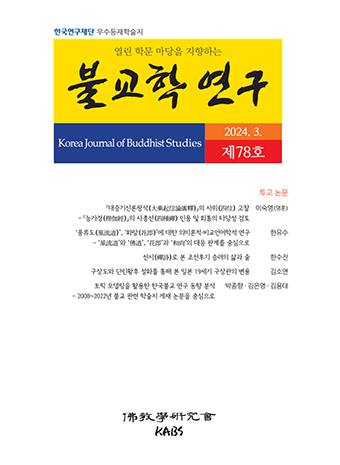Abstract
References
Sorry, not available.
Click the PDF button.
Information
The law of causality is the foundation of understanding of the world. Regardless of East and West, the traditional understanding of the world was mostly the linear unidirectional causal paradigm that sees the cause and effect in a linear and one-way direction of substances. The flow from cause to effect provides the general chain of cause and effect in the linear causality because it sees the relationship of cause and effect as a one-way relationship among substances. This chain of cause and effect ends up with presupposing the fundamental substance as the first cause. Or, it ends up with infinite regress. Consequently, the contradictory assertions are opposed to each other: Does substance exist or not? Is the fundamental substance the mind or matter? We are required to choose one out of the two contradictory assertions.The Buddha saw that the causal law is not a linear but a network because everything exists co-dependently. So there is neither the first cause nor the fundamental substance from the perspective of Buddhism because there is no a cause to be regress. There is only an endless changing process in a relationship that gives and takes effects each o ther. Therefore, Buddhism sees that substance is empty and relationship is real. The understanding of the world of Buddhism is based on this co-dependent causality, namely, the doctrine of co-dependent arising. From the perspective of the doctrine of co-dependent arising, the world is arising through the structure of human cognition. In other words, the foundation of the world is the structure of human cognition, and humans live and made themselves and the world on the basis of it. This is the thought of karma. According to the thought of karma, humans and nature are a changing process by the result of life, namely, by the life as karma. Depending upon how humans live, humans the mselves and their environments, nature, change. Humans change nature and nature does humans. So nature and humans are related in the way of being neither the same nor different.(不一不異) The above understanding on nature and humans is the basis of Buddhist ethics. Nature cannot exist without humans, and humans can neither without being related to nature. Humans are effected by nature and nature is effected by their life. Nature and humans are in one life in the relation of being neither the same nor different. The world of nature is not the world of objective facts that is not related to humans. Instead, it is understood and changed by the life of humans, and gives influence on human life. Therefore, ethics should be applied to not only the relationship of humans but also the relationship of humans and nature. Here there is a necessary requirement of environmental ethics which modern ethics regarded as an important subject. The core of morals is “justice” in western ethics. But “compassion” is the core of ethics in Buddhist ethics. Justice is based on a supposition that humans are separated individuals. Humans are confronted with each other in front of their interests. When the interest of the self and that of others are opposed, a fair principle of distribution is needed. Here justice comes to take place as a fair principle of distribution. Thus, in ethics of justice, nature is only an object of distribution for human beings in a fair way. Depending upon the doctrine of co-dependent arising Buddhism emphasizes “non-duelity of self and others”(自他不二) saying that both “you and I” and “humans and nature” are one. Through this thought, the self is extended from ”I” to “others,” and from “humans” to “nature.” When “the self” embraces “the others” and “nature” due to this extension, the opposition between humans, and humans and nature disappear. This extension of the self is done through the right understanding(般若, wisdom) on the relationship between humans and nature, and is realized through compassion(love). If the self is extended and embraces other beings, we will service others out of the mind of compassion and live in harmony with nature. In other words, when nature and humans are understood as one life in the structure of dependent co-arising, we will move from human- centered ethics toward life-centered ethics.
Click the PDF button.
- Publisher :Korean Association of Buddhist Studies
- Publisher(Ko) :불교학연구회
- Journal Title :Korea Journal of Buddhist Studies
- Journal Title(Ko) :불교학연구
- Volume : 2
- No :0
- Pages :77~103


 Korea Journal of Buddhist Studies
Korea Journal of Buddhist Studies






